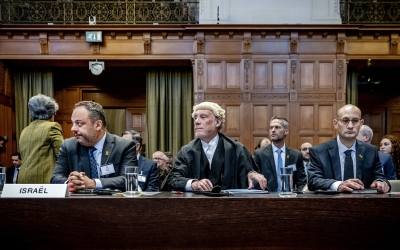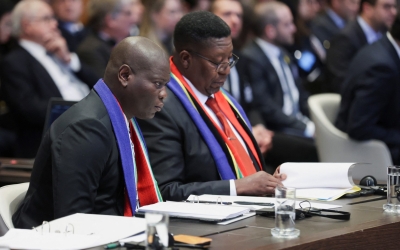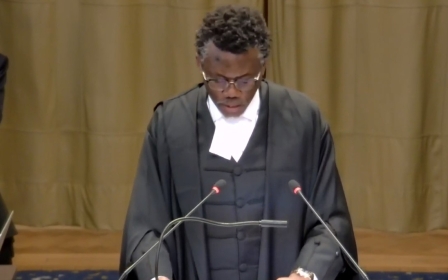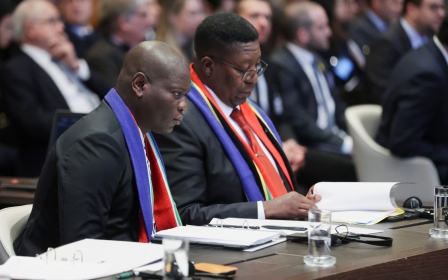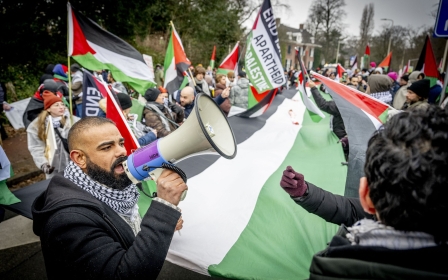War on Gaza: Israel blames Hamas for 23,000 Palestinian deaths at ICJ
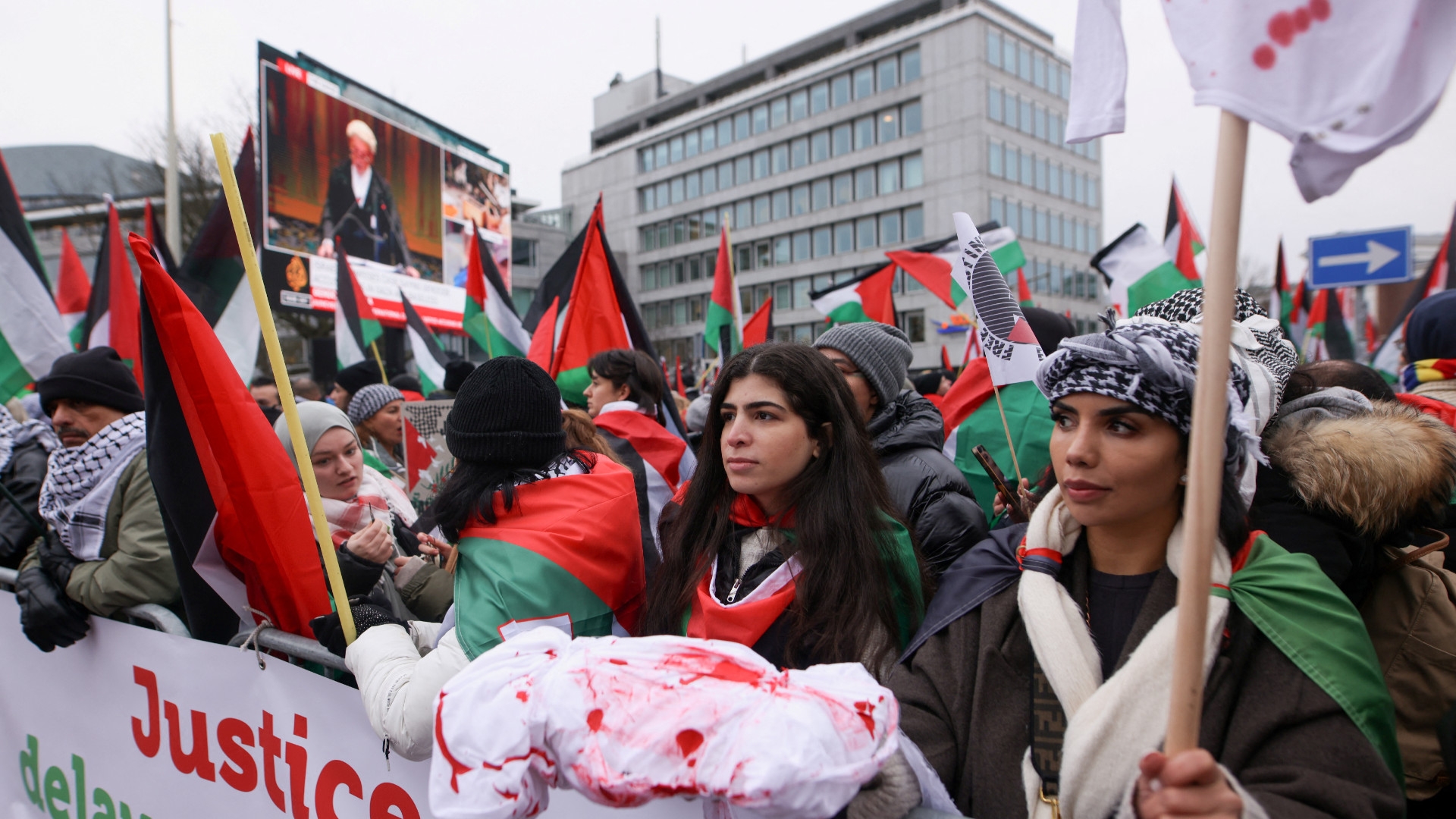
Israel's legal representatives say Hamas is responsible for the 23,000 Palestinians that have been killed by the Israeli bombing of Gaza.
Speaking during their response to South Africa's genocide case at the International Court of Justice (ICJ) on Friday they argued that there is "no genocide" in the besieged enclave and that the death toll was due to Hamas embedding itself among the civilian population.
They also claimed that Israel has been allowing some food and water into the strip, which "shows that Israel remains bound by its international and legal obligations, especially as a party to the genocide convention".
This comes as the United Nations humanitarian office deplored Israel's "systematic" refusal to grant aid access to northern Gaza.
Israel presented its case a day after Pretoria pleaded with judges to issue an interim order demanding Israel halt its offensive in the embattled territory.
New MEE newsletter: Jerusalem Dispatch
Sign up to get the latest insights and analysis on Israel-Palestine, alongside Turkey Unpacked and other MEE newsletters
In his opening statement for Israel, the legal adviser of the Israeli Ministry of Foreign Affairs, Tal Becker, said that Israel is in a "war of defence" against Hamas in response to the 7 October attack and that South Africa's request for Israel to stop attacking Gaza "cannot stand".
The Israeli advocate rejected South Africa's description of the suffering in Gaza as "unparalleled and unprecedented".
"What is unparalleled is the degree to which Hamas has entrenched itself in the civilian population," he said, adding that Hamas has "systematically and unlawfully embedded its military operations, fighters and assets throughout Gaza".
Becker said that South Africa is attempting to weaponise the term "genocide" against Israel and that the case made yesterday "ignored" the "wholesale massacre" committed by Hamas on 7 October that killed around 1,200 Israelis.
"The entirety of its case hinges on a deliberately curated, decontextualised and manipulative description of the reality of current hostilities," he said.
He did not address in detail the genocide claims that South Africa says Israel is committing in its assault on Gaza.
"The South Africa filing was astonishing in its clarity, detail, legal argument and impact," Andrew Feinstein, A South African former politician and activist told MEE.
"In 23 years of researching militarism, the arms trade & conflict I have never seen a more compelling documentation of violations of international law and genocide," he said.
'There is no genocide'
Malcolm Shaw, Israel's next legal representative, concluded that "there is no genocide," as evidence of Israel's genocidal intent is lacking, while its intention to defend itself '"certainly exists".
If there was any evidence of genocidal activity, he said, it was during Hamas' attack on 7 October.
He added that any attempts to reduce civilian deaths have gone "unnoticed" and mitigate against any allegation of genocidal intent.
He said that if Israeli forces acted unlawfully during the assault on Gaza, their actions would be dealt with by “Israel’s robust and independent legal system".
In October, Israel’s Defence Minister Yoav Gallant said: “We will eliminate everything… Gaza won’t return to what it was before.”
The third lawyer to represent Israel, Galit Raguan, blamed extensive civilian deaths in Gaza on Hamas' "strategy of embedding itself in the civilian population".
"Urban warfare will always result in tragic deaths, harm and damage," Raguan said. But in the case of Gaza, she argued, this was "exacerbated because these were the desired outcomes of Hamas".
She claimed that Hamas uses hospitals for military purposes, stating that there was evidence of Hamas activities in "every single hospital searched by Israel".
Despite evidence to the contrary, Raguan claimed that Israel had not bombed hospitals and that any damage and harm had occurred as a “result of hostilities” in the “vicinity” of hospitals.
Omri Sender, another representative for Israel, said that South Africa failed to mention Israel's "extraordinary efforts to improve the humanitarian situation in Gaza".
He claimed that the number of food trucks entering the besieged enclave had increased in recent weeks and that access to water was a "priority" for Israel.
The United Nations humanitarian office said on Friday that Israeli authorities were systematically denying it access to northern Gaza to deliver aid, and this had significantly hindered the humanitarian operation there.
South Africa's evidence
South African lawyer Adila Hassim told judges at The Hague on Thursday that "genocides are never declared in advance, but this court has the benefit of the past 13 weeks of evidence that shows incontrovertibly a pattern of conduct and related intention that justifies as a plausible claim of genocidal acts".
"Israel deployed 6,000 bombs per week… No one is spared. Not even newborns. UN chiefs have described it as a graveyard for children," she said.
"Nothing will stop the suffering except an order from this court."
South Africa submitted its case against Israel at the ICJ last month and has said Israel's actions in Gaza are "genocidal in character because they are intended to bring about the destruction of a substantial part of the Palestinian national, racial and ethnic group".
Another South African lawyer at the hearing, Tembeka Ngcukaitobi, said Pretoria was not alone in drawing attention to Israel's genocidal rhetoric.
Ngcukaitobi said that at least 15 UN special rapporteurs and 21 members of the UN working groups have warned that what is happening in Gaza reflects a genocide in the making.
He added that genocidal intent was evident in the way Israel's military was conducting attacks, including the targeting of family homes and civilian infrastructure.
"Israel's political leaders, military commanders and persons holding official positions have systematically and in explicit terms declared their genocidal intent," he added.
Ngcukaitobi said the "genocidal rhetoric" had become common within the Israeli Knesset, with several MPs calling for Gaza to be "wiped out, flattened, erased and crushed".
On Wednesday, Nissim Vaturi, a member of Israel's ruling Likud party, said it was a "privilege" for his country to appear at The Hague as he doubled down on earlier remarks where he said there are "no innocent people" in Gaza.
During Thursday's proceedings, Professor Max du Plessis, another lawyer representing South Africa, said Israel had subjected the Palestinian people to an oppressive and prolonged violation of their rights to self-determination for more than half a century.
Du Plessis added that based on materials shown before the court, the acts of Israel are plausibly characterised as genocidal.
"South Africa's obligation is motivated by the need to protect Palestinians in Gaza and their absolute rights not to be subjected to genocidal acts," he said.
Genocide cases, which are notoriously hard to prove, can take years to resolve, but South Africa is asking the court to speedily implement "provisional measures" and "order Israel to cease killing and causing serious mental and bodily harm to Palestinian people in Gaza".
The court's decisions are typically recognised by member countries, but the ICJ has few means of enforcing them. Any outcome is therefore likely to be symbolic.
In 2004, the court issued a non-binding opinion that Israel’s construction of its concrete barrier wall in the occupied West Bank was illegal and that it should be dismantled. More than 20 years later, walls and fences are still standing.
Middle East Eye delivers independent and unrivalled coverage and analysis of the Middle East, North Africa and beyond. To learn more about republishing this content and the associated fees, please fill out this form. More about MEE can be found here.


